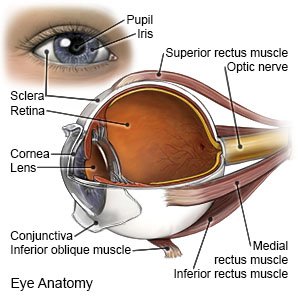Optic Neuritis
Medically reviewed by Drugs.com. Last updated on May 6, 2024.
AMBULATORY CARE:
Optic neuritis
is inflammation of the optic nerve. The optic nerve helps you see by sending an image from the front of the eye to the brain. Inflammation of the nerve leads to vision loss. Usually only one eye is affected, but you may have optic neuritis in both eyes.
 |
Seek care immediately if:
- You have vision loss in both eyes along with a headache or double vision.
Contact your healthcare provider if:
- You have new or worsening symptoms.
- Your symptoms do not improve within 1 to 2 weeks.
- You have questions or concerns about your condition or care.
Common signs and symptoms:
Vision loss can start within hours or days. The loss will be worst at 1 week. You may also have any of the following:
- Loss of vision, or trouble with depth perception (seeing how far away an object is)
- Seeing lights as dim or less bright than usual, or trouble seeing in direct sunlight
- Tenderness around your eye, or eye pain that is worse when you move your eye
- A blurry spot or quick flashes of light
- Trouble seeing color, especially red
- Blurred or foggy vision
- A headache (more common in children)
- Signs and symptoms happen when you exercise or are hot
Treatment:
Optic neuritis may go away on its own without treatment within a few months. It may take a year before your vision returns to normal or near normal. Even with treatment, your vision may not return completely to normal. If you have severe vision loss, steroid medicine may be used to reduce inflammation. The medicine may be given through an IV to help your vision clear more quickly. This may be done if you only have vision in 1 eye or you need to see clearly for work. Certain vitamins, such as vitamin A, can help protect your vision. You may also need to take vitamin B12 supplements if your optic neuritis was caused by a lack of vitamin B12. Do not take vitamins or other supplements without talking to your healthcare provider.
Treatment options
The following list of medications are related to or used in the treatment of this condition.
Follow up with your healthcare provider as directed:
You may need ongoing vision tests. Your healthcare provider may also refer you to a specialist to check for multiple sclerosis (MS). Optic neuritis is often the first sign of MS. You may need care to treat MS or to prevent optic neuritis if you are at risk for developing MS. Write down your questions so you remember to ask them during your visits.
© Copyright Merative 2024 Information is for End User's use only and may not be sold, redistributed or otherwise used for commercial purposes.
The above information is an educational aid only. It is not intended as medical advice for individual conditions or treatments. Talk to your doctor, nurse or pharmacist before following any medical regimen to see if it is safe and effective for you.
Learn more about Optic Neuritis
Treatment options
Care guides
Further information
Always consult your healthcare provider to ensure the information displayed on this page applies to your personal circumstances.
